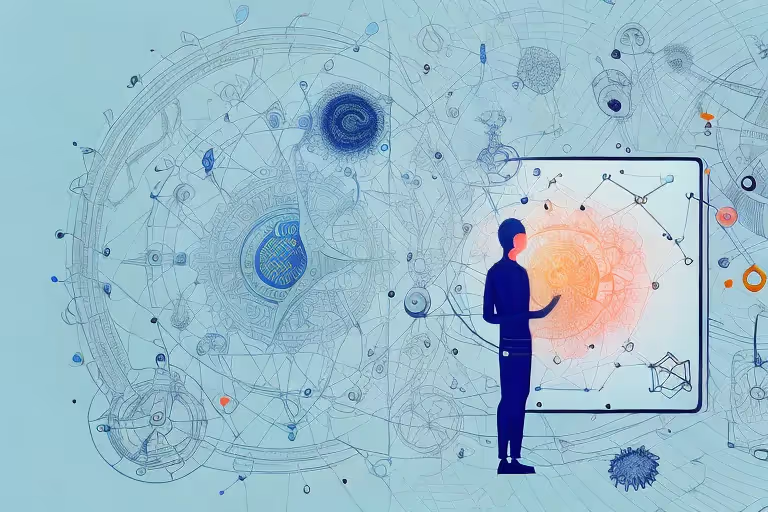Hypnosis has long been a topic of fascination, shrouded in mystery and misconceptions. While some people believe in its power to unlock the hidden depths of the mind, there are scientific objections to its effects. In this article, we will delve into the scientific objections surrounding hypnosis, aiming to shed light on this intriguing phenomenon.
Understanding Hypnosis: A Brief Overview
Before we can explore the scientific objections, it's important to have a basic understanding of what hypnosis is. Hypnosis is a state of deep relaxation and focused attention, during which the subconscious mind becomes more accessible. This altered state allows individuals to tap into their unconscious thoughts and emotions, potentially leading to a range of therapeutic benefits.
The history of hypnosis dates back to ancient civilizations, where it was used for various purposes such as healing and religious ceremonies. In modern times, hypnosis has gained recognition as a tool for addressing a wide array of issues, including pain management, addiction treatment, and even mental health challenges.
The History of Hypnosis
Hypnosis has a rich history that spans thousands of years. Ancient Egyptian and Greek cultures used trance-like states for healing purposes, while Hindu tradition includes stories of trance-like states induced by the god Shiva. In the 18th and 19th centuries, hypnosis became more widely recognized, thanks to the works of mesmerists like Franz Anton Mesmer and James Braid.
During the 18th century, Franz Anton Mesmer, an Austrian physician, developed a theory known as "animal magnetism" or "mesmerism." He believed that there was a natural magnetic force flowing through the universe and that he could manipulate this force to induce healing in his patients. Mesmer's techniques involved gestures, passes, and the use of magnets to influence the energy flow in the body.
James Braid, a Scottish surgeon, further advanced the understanding of hypnosis in the 19th century. Braid rejected the idea of animal magnetism and instead focused on the power of suggestion. He coined the term "hypnosis" from the Greek word "hypnos," meaning sleep, although hypnosis is not actually a state of sleep. Braid believed that hypnosis was a state of heightened focus and concentration.
The process of hypnosis involves inducing a trance-like state through relaxation techniques and suggestions. The hypnotist guides the individual into a deep state of relaxation, where their subconscious mind is more open to suggestions. This process can vary depending on the techniques used and the goals of the hypnotherapy session.
There are various techniques that can be used to induce hypnosis, including progressive muscle relaxation, guided imagery, and deep breathing exercises. Once the individual is in a relaxed state, the hypnotist may provide suggestions or engage in therapeutic dialogue to address specific concerns or goals. The subconscious mind, which is responsible for our automatic thoughts, emotions, and behaviors, can be influenced and reprogrammed during this state of heightened suggestibility.
It's important to note that hypnosis is not a form of mind control. The individual undergoing hypnosis retains their free will and can choose to accept or reject suggestions based on their own beliefs and values. Hypnosis is a collaborative process between the hypnotist and the individual, with the goal of facilitating positive change and personal growth.
The Science Behind Hypnosis
While hypnosis has gained popularity in various fields, including psychology and medicine, there are scientific objections regarding its effects. These objections stem from skepticism within the medical community and the lack of empirical evidence to support some of the claims made about hypnosis.
The Role of the Subconscious
One of the primary objections to hypnosis is the belief that the subconscious mind does not have the power to influence behavior and emotions to the extent suggested by hypnotherapists. Critics argue that any changes observed during hypnosis may simply be the result of the power of suggestion or other psychological factors, rather than a direct influence of the subconscious mind.
However, proponents of hypnosis argue that research has shown the subconscious mind's potential role in shaping our thoughts, emotions, and behaviors. They point to studies that demonstrate how hypnosis can be effective in addressing conditions like anxiety, phobias, and even addiction, which suggests that the subconscious mind may play a significant role in these processes.
Hypnosis and Brain Activity
Another objection to hypnosis comes from the lack of consensus on its effects on brain activity. While some studies have shown changes in brain activity during hypnosis, others have failed to find significant differences compared to normal waking states. This discrepancy has raised questions about the reliability and reproducibility of the findings, leading skeptics to question the validity of claims made about the brain's response to hypnosis.
Despite these objections, ongoing research aims to further our understanding of the neural mechanisms underlying hypnosis. Advances in technology, such as functional magnetic resonance imaging (fMRI), offer new possibilities for investigating the brain changes associated with hypnotic states. With further research and advancements, we may gain a clearer picture of how hypnosis affects brain activity.
Common Misconceptions about Hypnosis
Alongside the scientific objections, it's important to address some of the common misconceptions about hypnosis that contribute to skepticism. These misconceptions often arise from depictions of hypnosis in popular culture, which portray it as a tool for mind control or a state of unconsciousness similar to sleep.
Hypnosis as Mind Control
Contrary to popular belief, hypnosis is not a form of mind control. It does not give the hypnotist the ability to control the thoughts, beliefs, or actions of the individual being hypnotized. Instead, hypnosis is a collaborative process that relies on the individual's willingness to engage and respond to suggestions. The person undergoing hypnosis retains their critical thinking abilities and can choose to accept or reject the suggestions presented to them.
The "Sleep" Misconception
Another common misconception is that hypnosis is a state of unconsciousness or sleep. In reality, hypnosis is a heightened state of consciousness where individuals are fully aware of their surroundings and retain control over their actions. While relaxation is a common feature of hypnosis, it is not synonymous with sleep. Hypnotized individuals are in a deep state of relaxation but remain conscious and receptive to suggestions.
Scientific Objections to Hypnosis
Despite the long history and potential benefits of hypnosis, scientific objections continue to be raised regarding its effectiveness and validity. Skepticism within the medical community, in particular, has posed challenges to the widespread acceptance of hypnosis as a therapeutic tool.
The Skepticism of the Medical Community
Within the medical community, skepticism towards hypnosis stems from the lack of empirical evidence and the inconsistent findings across studies. Some medical professionals argue that the reported benefits of hypnosis may be attributed to a placebo effect or other non-specific factors, rather than the direct effects of hypnosis itself.
However, proponents of hypnosis emphasize the importance of rigorous research and evidence-based practice to address these objections. They argue that while more research is needed, the existing evidence suggests that hypnosis could be a valuable addition to traditional medical treatments.
Lack of Empirical Evidence
Another common objection to hypnosis is the limited amount of high-quality empirical evidence supporting its effectiveness for various conditions. Critics argue that the majority of studies conducted thus far suffer from small sample sizes, lack of control groups, or other methodological limitations that limit the generalizability of the findings.
While these objections are valid, it is worth noting that there is a growing body of research that supports the use of hypnosis in certain contexts. For example, studies have shown promising results in using hypnosis for pain management, smoking cessation, and anxiety disorders. Furthermore, ongoing research continues to explore the potential applications of hypnosis in various areas of healthcare.
Case Studies: Hypnosis in Practice
One way to examine the practical applications of hypnosis is through case studies that illustrate how hypnosis can be used effectively in different contexts. These case studies provide valuable insights into the potential benefits and limitations of hypnosis as a therapeutic tool.
Hypnosis in Pain Management
Pain management is one area where hypnosis has shown promise. Numerous studies have demonstrated its effectiveness in reducing chronic pain, including conditions such as fibromyalgia, migraines, and post-surgical pain. Hypnosis can help individuals with chronic pain develop coping strategies and reduce their reliance on pain medication.
Furthermore, hypnosis can be used as an adjunctive therapy alongside traditional pain management techniques, such as medication and physical therapy. By addressing the psychological factors that contribute to pain perception, hypnosis offers a holistic approach to pain management.
Hypnosis in Mental Health Treatment
Another area of interest is the use of hypnosis in mental health treatment. Hypnotherapy has been found to be effective in treating conditions such as anxiety disorders, phobias, and post-traumatic stress disorder (PTSD). By accessing the subconscious mind, hypnosis can help individuals identify and reframe negative thought patterns, manage anxiety, and overcome traumatic experiences.
However, it is important to note that hypnosis is not a standalone treatment for mental health conditions. It is typically used as part of a comprehensive treatment plan that may include psychotherapy, medication, and other evidence-based interventions.
In conclusion, while scientific objections to hypnosis exist, it is crucial to approach the topic with an open mind. Hypnosis has a long history and has demonstrated potential benefits in various areas, including pain management and mental health treatment. However, more research is needed to address the scientific objections and establish a clear understanding of its mechanisms of action. With continued exploration and a commitment to evidence-based practice, hypnosis may become an increasingly recognized and accepted therapeutic tool.
Unlock the power of your mind and discover new ways to improve your well-being with the Aura Health App. With a wide range of guided meditations and relaxation techniques, Aura can help you achieve a state of deep relaxation and tap into the potential of your subconscious mind. Start your journey towards better mental and emotional health today.
Aura is Your All In One App for Meditation, Mindfulness Wellbeing
Find peace every day with one app for your whole well-being. There is no one-size-fits-all solution to mental well-being. Aura is the first all-in-one wellness app that learns how to best help you. Discover an endless library of expert-created tracks for your well-being, all taught by the world’s best coaches, therapists, and storytellers. With Aura's personalized recommendations, you can find peace every morning, day and night.



.webp)






.avif)

%20(1).avif)


.avif)
.avif)
.webp)


.avif)


















































































































.avif)

















.svg)









